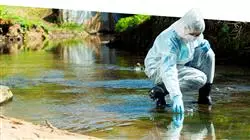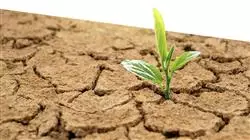University certificate
The world's largest faculty of engineering”
Introduction to the Program
This Professional master’s degree will help you to advance your professional engineering career and contribute to environmental conservation”

The figures and data provided by the United Nations with Cone to the consumption of environmental resources and pollution leave no doubt as to the urgent need to implement effective measures and develop new projects. In this scenario, engineers play a leading role thanks to their technical knowledge and how their activity transforms The environment.
Thus, their technical and technological initiatives can contribute to reducing water consumption and pollution, or to implementing methodologies that will decontaminate the air or soil. However, to achieve this, engineers must have some knowledge of Conservation Ecology, which they will be able to acquire through this TECH Conservation Ecology.
In this way, through a 100% online program, graduates will be able to delve into ecology, environmental epidemiology and public health, land management, technical developments on the diagnosis and recovery of the landscape, as well as geographic information systems. All this, with a theoretical approach, but at the same time practical thanks to the case studies provided by the specialists who teach this program.
Engineering professionals are, therefore, upon an excellent opportunity to study a Professional master’s degree at their own convenience. You only need an electronic device with an Internet connection to access the Virtual Classroom where the syllabus of this program is hosted. What is more, the Relearning system, used by TECH in all its programs, will allow students to reduce the long study hours so common to other methods.
Take this program and acquire an advanced education in geographic information systems and modernizing environmental systems”
This Professional master’s degree in Conservation Ecology contains the most complete and up-to-date program on the market. The most important features include:
- Practical cases presented by experts in Ecology and Engineering
- The graphic, schematic, and practical contents with which they are created, provide scientific and practical information on the disciplines that are essential for professional practice
- Practical exercises where self-assessment can be used to improve learning
- Its special emphasis on innovative methodologies
- Theoretical lessons, questions to the expert, debate forums on controversial topics, and individual reflection assignments
- Content that is accessible from any fixed or portable device with an Internet connection
Do you have an engineering project in mind that favors human wel-being? Before taking the plunge, enroll in the Professional master’s degree in Conservation Ecology”
The program’s teaching staff includes professionals from the sector who contribute their work experience to this educational program, as well as renowned specialists from leading societies and prestigious universities.
Its multimedia content, developed with the latest educational technology, will allow professionals to learn in a contextual and situated learning environment, i.e., a simulated environment that will provide immersive education programmed to prepare in real situations.
The design of this program focuses on Problem-Based Learning, by means of which professionals must try to solve the different professional practice situations that are presented to them throughout the program. For this purpose, the student will be assisted by an innovative interactive video system created by renowned and experienced experts.
If you have a computer with an Internet connection, you already have the necessary tool to take this 100% online program. Enroll now"

With this academic program you will gain an improved understanding of the way ecosystems function and their link to engineering"
Why study at TECH?
TECH is the world’s largest online university. With an impressive catalog of more than 14,000 university programs available in 11 languages, it is positioned as a leader in employability, with a 99% job placement rate. In addition, it relies on an enormous faculty of more than 6,000 professors of the highest international renown.

Study at the world's largest online university and guarantee your professional success. The future starts at TECH”
The world’s best online university according to FORBES
The prestigious Forbes magazine, specialized in business and finance, has highlighted TECH as “the world's best online university” This is what they have recently stated in an article in their digital edition in which they echo the success story of this institution, “thanks to the academic offer it provides, the selection of its teaching staff, and an innovative learning method aimed at educating the professionals of the future”
A revolutionary study method, a cutting-edge faculty and a practical focus: the key to TECH's success.
The most complete study plans on the university scene
TECH offers the most complete study plans on the university scene, with syllabuses that cover fundamental concepts and, at the same time, the main scientific advances in their specific scientific areas. In addition, these programs are continuously being updated to guarantee students the academic vanguard and the most in-demand professional skills. In this way, the university's qualifications provide its graduates with a significant advantage to propel their careers to success.
TECH offers the most comprehensive and intensive study plans on the current university scene.
A world-class teaching staff
TECH's teaching staff is made up of more than 6,000 professors with the highest international recognition. Professors, researchers and top executives of multinational companies, including Isaiah Covington, performance coach of the Boston Celtics; Magda Romanska, principal investigator at Harvard MetaLAB; Ignacio Wistumba, chairman of the department of translational molecular pathology at MD Anderson Cancer Center; and D.W. Pine, creative director of TIME magazine, among others.
Internationally renowned experts, specialized in different branches of Health, Technology, Communication and Business, form part of the TECH faculty.
A unique learning method
TECH is the first university to use Relearning in all its programs. It is the best online learning methodology, accredited with international teaching quality certifications, provided by prestigious educational agencies. In addition, this disruptive educational model is complemented with the “Case Method”, thereby setting up a unique online teaching strategy. Innovative teaching resources are also implemented, including detailed videos, infographics and interactive summaries.
TECH combines Relearning and the Case Method in all its university programs to guarantee excellent theoretical and practical learning, studying whenever and wherever you want.
The world's largest online university
TECH is the world’s largest online university. We are the largest educational institution, with the best and widest online educational catalog, one hundred percent online and covering the vast majority of areas of knowledge. We offer a large selection of our own degrees and accredited online undergraduate and postgraduate degrees. In total, more than 14,000 university degrees, in eleven different languages, make us the largest educational largest in the world.
TECH has the world's most extensive catalog of academic and official programs, available in more than 11 languages.
Google Premier Partner
The American technology giant has awarded TECH the Google Google Premier Partner badge. This award, which is only available to 3% of the world's companies, highlights the efficient, flexible and tailored experience that this university provides to students. The recognition as a Google Premier Partner not only accredits the maximum rigor, performance and investment in TECH's digital infrastructures, but also places this university as one of the world's leading technology companies.
Google has positioned TECH in the top 3% of the world's most important technology companies by awarding it its Google Premier Partner badge.
The official online university of the NBA
TECH is the official online university of the NBA. Thanks to our agreement with the biggest league in basketball, we offer our students exclusive university programs, as well as a wide variety of educational resources focused on the business of the league and other areas of the sports industry. Each program is made up of a uniquely designed syllabus and features exceptional guest hosts: professionals with a distinguished sports background who will offer their expertise on the most relevant topics.
TECH has been selected by the NBA, the world's top basketball league, as its official online university.
The top-rated university by its students
Students have positioned TECH as the world's top-rated university on the main review websites, with a highest rating of 4.9 out of 5, obtained from more than 1,000 reviews. These results consolidate TECH as the benchmark university institution at an international level, reflecting the excellence and positive impact of its educational model.” reflecting the excellence and positive impact of its educational model.”
TECH is the world’s top-rated university by its students.
Leaders in employability
TECH has managed to become the leading university in employability. 99% of its students obtain jobs in the academic field they have studied, within one year of completing any of the university's programs. A similar number achieve immediate career enhancement. All this thanks to a study methodology that bases its effectiveness on the acquisition of practical skills, which are absolutely necessary for professional development.
99% of TECH graduates find a job within a year of completing their studies.
Professional Master's Degree in Conservation Ecology
Today, Ecology and Engineering are two closely related disciplines, largely due to the growing environmental awareness of both society and the professionals themselves. The environmental degradation of recent decades has made it increasingly necessary for engineers to possess greater knowledge about the conservation of ecosystems through projects specifically designed to protect them or initiatives that take into account the environmental impact from the outset. Thus, this Master's Degree in Conservation Ecology offers students a complete specialization in topics such as Land Management, Environmental Microbiology and modernization of environmental systems. Undoubtedly, this will allow them to advance in their career with solid foundations thanks to the innovative didactic resources offered by the program.
Design the best strategies for modernization of environmental systems
Always 100% online, this Professional Master's Degree in Conservation Ecology offers engineers a specialization in Ecology, Environmental Epidemiology and Public Health, Land Management, Landscape Diagnosis and Recovery, as well as Geographic Information Systems. Although the focus is mainly theoretical, the degree also offers practical case studies presented by experts in the field. This is a great opportunity for engineering professionals to perfect their knowledge comfortably and in their own time, as they only need a device with an Internet connection to access the online syllabus. In addition, thanks to the Relearning system employed by TECH, students can save time and reduce the amount of hours needed for study compared to other teaching methodologies.
"







